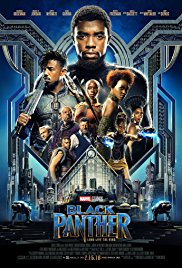 A movie with as much hype as Black Panther needed young director Ryan Coogler to hit another home run. He had successfully launched his and Michael B. Jordan’s careers with his debut festival hit, Fruitvale Station, followed by the unlikely successful Rocky movies sequel, Creed. Black Panther had made a huge splash when he appeared in Captain America: Civil War and had everyone excited to see the introduction of an African-American superhero in the title role. It all was poised to be a massive success or fall very short of the anticipation. The result? It delivered on the hype!
A movie with as much hype as Black Panther needed young director Ryan Coogler to hit another home run. He had successfully launched his and Michael B. Jordan’s careers with his debut festival hit, Fruitvale Station, followed by the unlikely successful Rocky movies sequel, Creed. Black Panther had made a huge splash when he appeared in Captain America: Civil War and had everyone excited to see the introduction of an African-American superhero in the title role. It all was poised to be a massive success or fall very short of the anticipation. The result? It delivered on the hype!
Taking place after the events of the aforementioned Civil War, Black Panther introduces us to the new King of Wakanda, T’Challa, played by Chadwick Boseman. After the death of his father, T’Chaka, in Civil War, he must return to Wakanda and properly ascend to his throne. Afer his return and takes up the mantle of King and Black Panther, he sets out to bring to justice Ulysses Klaue (Andy Serkis), who had previously stolen Wakanda’s principal resource, vibranium and killed many Wakandans in the process. The plot thickens when one of Klaue’s associates, Erik Killmonger (Michael B. Jordan), turns out to be a bigger threat to T’Challa and have a previously unknown, direct claim to the throne of Wakanda.
A major victory, among many, for this movie is this central conflict between Jordan’s Killmonger and Boseman’s T’Challa. The performances are top-shelf from both actors. Boseman has a quiet ferocity as the King of Wakanda but also conveys a steady courage befitting of someone honoring the legacy of his father and holding the weight of expectations of a nation on his shoulders. He’s a brother, son, and leader, not to mention a superhero. Boseman plays it all with a “cool-as-a-cucumber” demeanor that works in this movie. It is when he must be ferocious as his superhero persona where his character grows, i.e. when he confronts Klaue in the second act and Killmonger in the third.
Likewise, Michael B. Jordan as Killmonger may be the best performance in the whole movie. Jordan is magnetic and every scene of his steals the show. Whereas Boseman has a kingly coolness, Jordan is a firebrand of righteous indignation and revenge. The death of his father, T’Challa’s uncle, at the hands of T’Chaka, drives him to return to Wakanda both to avenge him and fulfill his father’s desires to see Wakanda use their technological superiority to overcome the oppression of African people.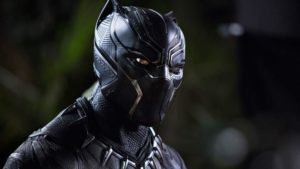
And this conflict gets to the heart of Black Panther. What responsibility do a powerful, advanced nation and its leader have when the world around is corrupt? Wakanda had always remained isolated, advancing its own interests and avoiding the chaos of the outside world. T’Challa and the Wakandans continued this legacy until challenged by his cousin. Killmonger sees the corruption but also the oppression and uses his life of training to overthrow his cousin in combat. In my favorite shot of the film, Coogler starts the camera upside-down and slowly corkscrews to right the camera on Killmonger.His only solution is to invert how Wakanda has always operated. No longer do they sit idly by but will take action and defeat their global oppressors and use their advanced technology to remake Earth.
Ultimately, the movie shows this answer to be unsatisfying. To corrupt one’s power to fight corruption will only further isolate you from those you fight. In the movie’s epilogue, T’Challa sets Wakanda on a new course of sharing its technology and doing so because, “in times of crisis the wise build bridges, while the foolish build barriers.” Setting aside the deliciousness of this as a statement relevant to our current political and cultural atmosphere, it subverts Killmonger’s misguided passion to show Wakanda’s power and makes the more difficult decision to strive for righteousness and the good of others even though it may not be fully deserved. The heartbeat of this movie strongly beats with a message that the power to give life is a greater pursuit than selfishly hoarding it or using it as an iron fist.
You might be thinking, plenty of Marvel movies have beat with heart. Iron Man was literally the story of Tony Stark repenting of his old life and getting a new heart. Captain America gave us the heart of an American hero. Guardians of the Galaxy was about the ragtag nature of friends turned into family. However, of all the now eighteen movies to be released in the MCU, Black Panther is the first to reverberate with soul.
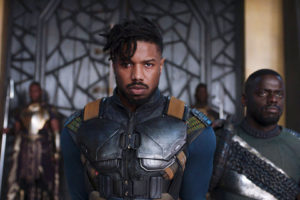 The depth of soul begins with a Marvel movie first. A big knock against previous MCU films has been the forgettable and lackluster soundtrack, the most articulate case against the soundtracks being the now-shuttered Every Frame A Painting’s video essay. It seems like Marvel may have found an answer to make their music more memorable by delving into music rooted in the soul of the characters being explored. Much has been made of Kendrick Lamar’s collaborations with the film, and his portions do deliver weight and inventiveness to the overall soundtrack. The normal film score by Ludwig Goransson, who also collaborated with Coogler on Creed, is different than what we are used to, as well. Infused with the expressive, naturalistic sounds of African world music, Goransson’s score contributes leitmotifs we can actually connect with major and minor characters and melds the audience into the world of Wakanda.
The depth of soul begins with a Marvel movie first. A big knock against previous MCU films has been the forgettable and lackluster soundtrack, the most articulate case against the soundtracks being the now-shuttered Every Frame A Painting’s video essay. It seems like Marvel may have found an answer to make their music more memorable by delving into music rooted in the soul of the characters being explored. Much has been made of Kendrick Lamar’s collaborations with the film, and his portions do deliver weight and inventiveness to the overall soundtrack. The normal film score by Ludwig Goransson, who also collaborated with Coogler on Creed, is different than what we are used to, as well. Infused with the expressive, naturalistic sounds of African world music, Goransson’s score contributes leitmotifs we can actually connect with major and minor characters and melds the audience into the world of Wakanda.
Moreso than it’s heart or its soulful music, this movie is about a people and blood. Shot through with African imagery, lore, and spirituality, Black Panther feels like a movie less made for the screen than birthed by a culture. It dances with the bright colors of many African nations, pulses with confidence, and takes a strong stand for the power of women and the importance of the black experience. It’s about heritage and the legacy of great nations.
We’ve had plenty of movies about family and home, but Black Panther, at its spiritual center, is about something as a white American from Wisconsin I cannot understand. This is why Coogler’s movie may be the most important film in the MCU. Instead of comfortably finding the morality and formative lessons within it, it challenges me to learn things about African culture, the global black experience, and to listen to my African-American neighbors about their experience in our country and throughout history. For this and many other reasons, I am grateful and awestruck by Black Panther as an important cultural moment and one of the best movies in the MCU.

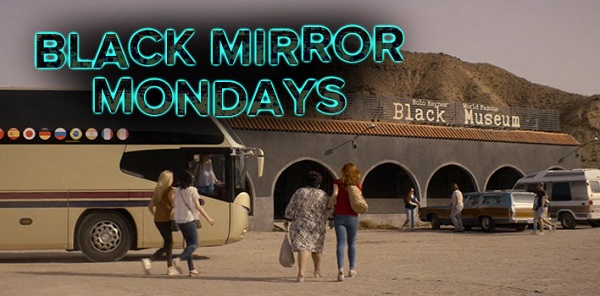
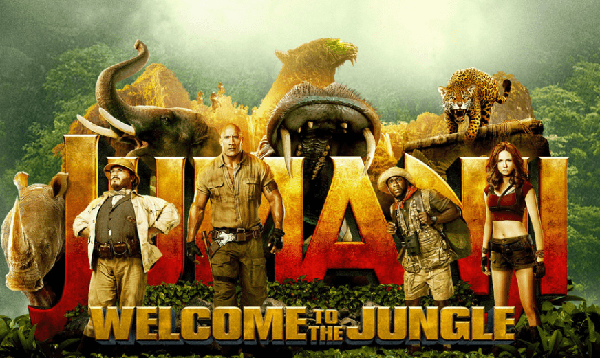
1 comment